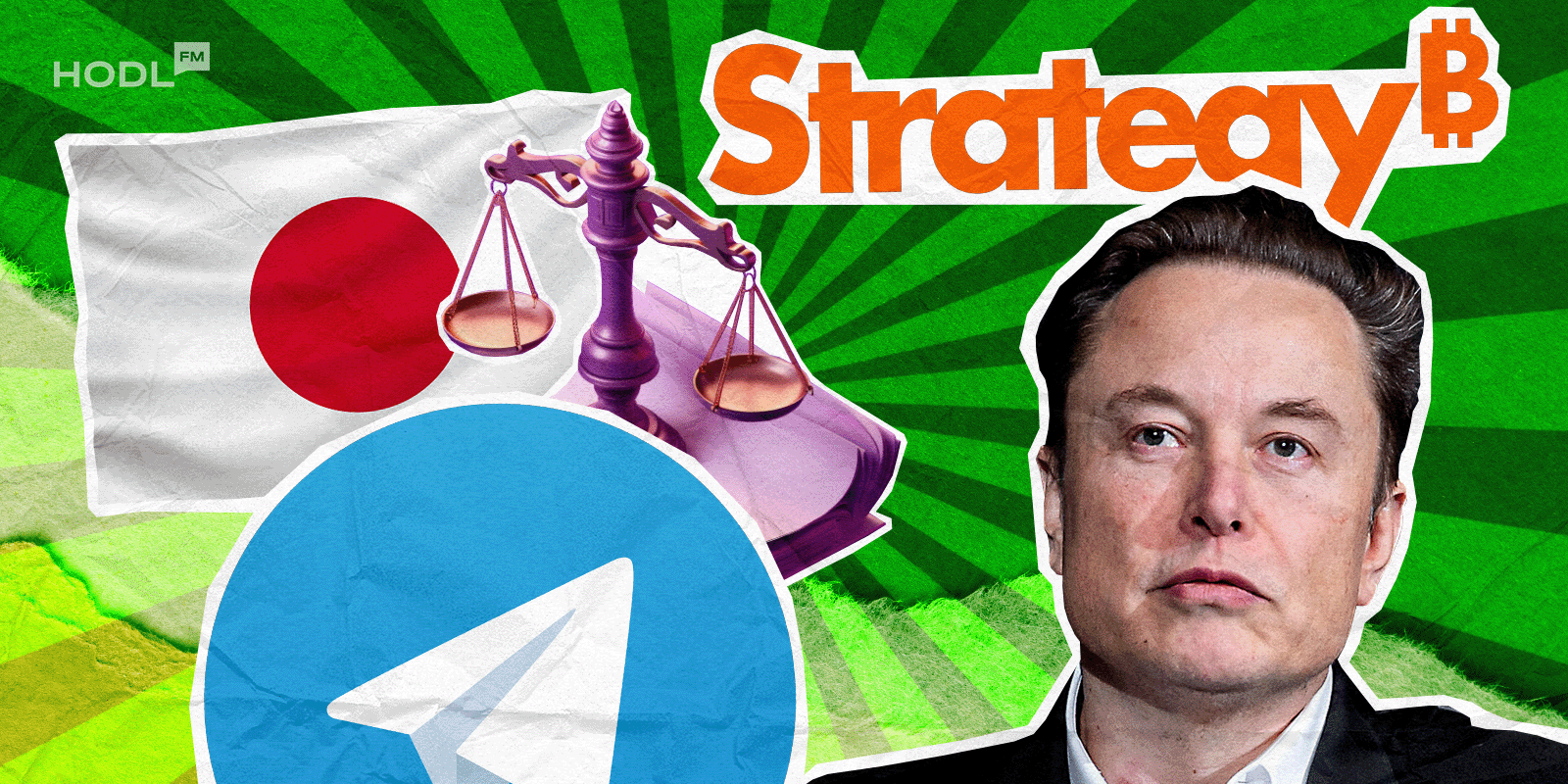Crypto’s as wild as ever this week. Elon Musk praises Bitcoin again, scammers hit Monad’s Telegram, Michael Saylor keeps stacking sats, and Japan tightens crypto laws.
Get ready for this week's digest, but first, let's see the top gainers and losers of this bloody week.
Top gainers and losers

1. PAX Gold (PAXG) - increased 8.49% this week, to a total price of $4,337.38
2. Tether Gold(XAUt) - raised 7,89%, totaling $4,306.64
3. Morpho (MORPHO) - with a 1,50% small gain, reached a price of $1,70

1. Artificial Superintelligence (FET) - lost 44,89 % this week to a price of $0,2705
2. MYX Finance (MYX) - 42,98% loss after a week, with a total price of $2.88
3. Optimism (OP) - 42,38% drop after a few days, with an end price of $0.4189
Elon Musk hails Bitcoin as a shield against fiat inflation amid the AI arms race
Billionaire entrepreneur Elon Musk has renewed his support for Bitcoin (BTC), calling it resistant to government‑driven debasement of fiat currencies that may intensify as global powers finance artificial intelligence development.
In a Tuesday post on X, the Tesla CEO said Bitcoin’s proof‑of‑work model makes it immune to manipulation through money printing.
“You can issue fake fiat currency, and every government in history has done so, but it is impossible to fake energy,” Musk wrote. “That is why Bitcoin is based on energy.”
Musk’s comments responded to financial blog ZeroHedge, which linked recent gains in Bitcoin and precious metals to “debasement to fund the AI arms race.” The post said governments in the United States and China are expected to underwrite massive AI expenditures, fueling inflationary pressure.
The statement marks Musk’s first major Bitcoin comment since November 2022, when he predicted a “long winter” for the crypto market following the collapse of FTX, which caused nearly $9 billion in investor losses.
BTC will make it, but might be a long winter
— Elon Musk (@elonmusk) November 14, 2022
Despite his renewed endorsement, Musk has not addressed his earlier environmental concerns. Tesla suspended Bitcoin payments in May 2021, citing fossil‑fuel dependence in mining. While the automaker still holds most of its Bitcoin, it has not reinstated BTC payments despite Musk’s past pledge to do so once the industry achieved at least 50% clean‑energy usage, a milestone some analysts say was surpassed in 2023.
Scammers target the Monad telegram channel with Fake airdrop ads ahead of token launch
Malicious actors have infiltrated the official Telegram channel of Monad, a new layer‑1 blockchain network, by purchasing advertisements that impersonate the project’s upcoming claim portal.
Monad co-founder Keone Hon alerted the community in a post on X, warning users not to click advertisements that appear even inside the project’s verified announcement channel.
“Crazy that Telegram will push content directly into a channel that otherwise only contains content from one party,” Hon wrote.
The incident occurred just before the highly anticipated MON token airdrop, scheduled to open at 1:00 p.m. UTC on Tuesday. Scammers appear to be exploiting heightened traffic ahead of the event. Hon urged users to remain cautious, emphasizing that the portal will remain open for three weeks, and there is no need to act with urgency.
Meanwhile, MON futures on crypto derivatives platform Hyperliquid are trading at about $0.07, implying a fully diluted valuation (FDV) near $7 billion based on the token’s total supply. The speculative pricing underscores investor interest in Monad’s performance claims.
Monad aims to provide an EVM‑compatible layer‑1 with enhanced throughput and near‑instant finality. The team says its technology can process up to 10,000 transactions per second through parallelized execution.
The fake ads appear to violate Telegram’s advertising policies, which prohibit phishing and deceptive promotions. While Telegram lists strict compliance requirements, the episode highlights a need for stronger ad‑screening standards across its network.
Michael Saylor’s Strategy expands Bitcoin holdings as BTC hits record highs
Michael Saylor’s Strategy, the world’s largest publicly traded Bitcoin holder, has expanded its BTC reserves amid the cryptocurrency’s surge to new all‑time highs.
Saylor announced on X that the company acquired 220 Bitcoin for $27.2 million, at an average purchase price of $123,561 per coin. The latest acquisition brings Strategy’s total holdings to 640,250 BTC, valued at roughly $47.38 billion, with an average cost basis near $74,000 per coin.
Strategy has acquired 220 BTC for ~$27.2 million at ~$123,561 per bitcoin and has achieved BTC Yield of 25.9% YTD 2025. As of 10/12/2025, we hodl 640,250 $BTC acquired for ~$47.38 billion at ~$74,000 per bitcoin. $MSTR $STRC $STRK $STRF $STRD https://t.co/v3IsCOaoeQ
— Michael Saylor (@saylor) October 13, 2025
The purchase occurred as Bitcoin briefly topped $126,200 on Oct. 6, before retreating to around $107,000 during a sharp market correction later in the week, according to Coinbase data.
Commenting on market volatility, Saylor quipped on X, “No tariffs on Bitcoin,” referencing investor anxiety over new China tariffs hinted at by U.S. President Donald Trump.
According to Saylor, Strategy’s BTC Yield, a metric representing the ratio between Bitcoin holdings and diluted shares outstanding, has risen 25.9% year‑to‑date following the latest buy.
The company previously added 196 BTC in late September but remained quiet during the first week of October. Strategy also highlighted its ongoing efforts to securitize Bitcoin for equity and credit investors through at‑the‑market offerings, including Series A Perpetual Strife and Strike Preferred Stocks.
Despite the growing Bitcoin position, Strategy’s MSTR shares slid from $360 to $309 last week, down 33% from July highs but still up 63% year‑over‑year, tracking Bitcoin’s longer‑term gains.
Japan set to introduce crypto insider trading regulations
Japan’s financial watchdog is preparing to launch a regulatory framework to ban and penalize crypto insider trading, a move that would align digital assets more closely with traditional securities markets.
According to Nikkei Asia, the Securities and Exchange Surveillance Commission (SESC) will be empowered to investigate suspicious trading activities and impose fines based on illicit profits. In severe cases, authorities could also make criminal referrals.
Japan to ban cryptocurrency insider trading with new rules https://t.co/TaOS9550Pm
— Nikkei Asia (@NikkeiAsia) October 14, 2025
Currently, Japan’s Financial Instruments and Exchange Act (FIEA) does not cover cryptocurrencies, leaving the country’s Virtual and Crypto Assets Exchange Association to self‑regulate, though it lacks tools to detect insider activity. The Financial Services Agency (FSA), which oversees the SESC, intends to finalize a detailed proposal by the end of 2025, with the goal of submitting FIEA amendments next year.
Regulators reportedly face challenges in applying insider trading principles to many tokens, as they often lack a clear issuer or governing entity.
The move comes as Japan’s crypto user base has quadrupled to 7.88 million in five years, representing 6.3% of the population, amid growing interest in digital assets.
Meanwhile, Sanae Takaichi, widely expected to become Japan’s next prime minister, could add pro‑technology momentum to financial markets. She advocates for blockchain development, technological sovereignty, and looser monetary policy, all of which could invigorate Japan’s crypto ecosystem.

Disclaimer: All materials on this site are for informational purposes only. None of the material should be interpreted as investment advice. Please note that despite the nature of much of the material created and hosted on this website, HODL FM is not a financial reference resource, and the opinions of authors and other contributors are their own and should not be taken as financial advice. If you require advice. HODL FM strongly recommends contacting a qualified industry professional.





